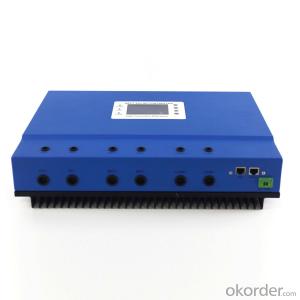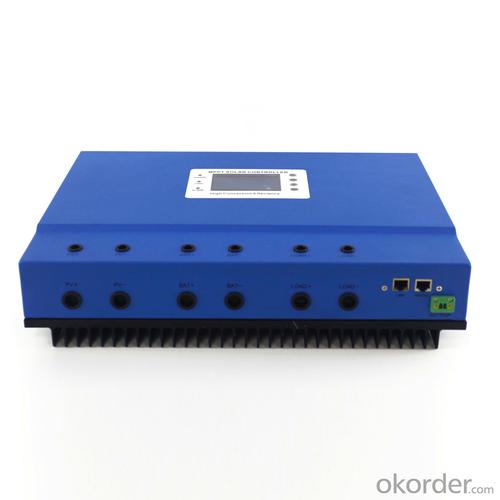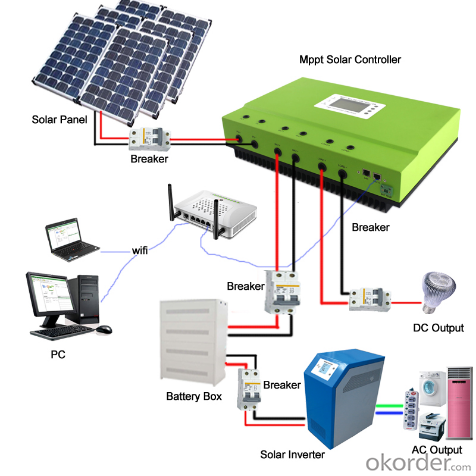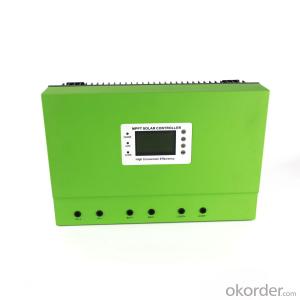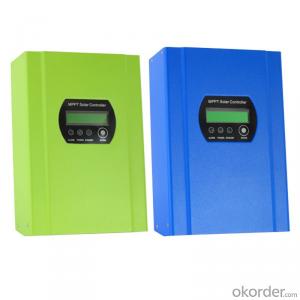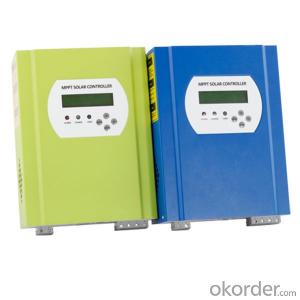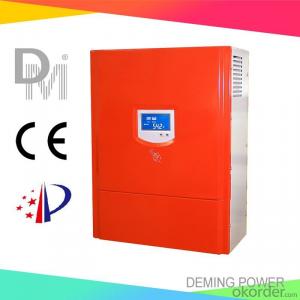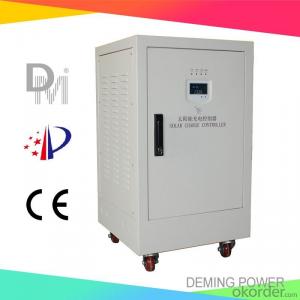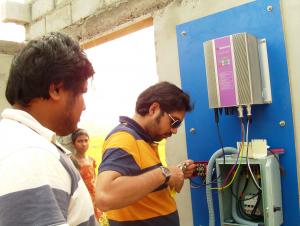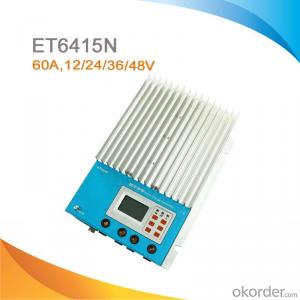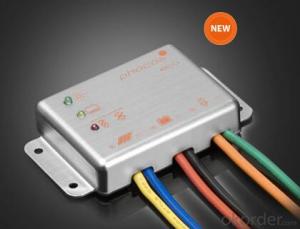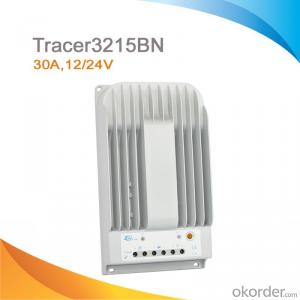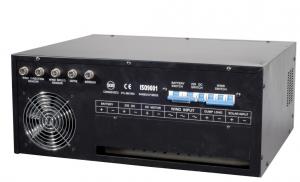Leading Solar Controllers Master100A MPPT Solar Regulator, 12V 24V 36V 48V Charge Controller 4000W
- Loading Port:
- China main port
- Payment Terms:
- TT OR LC
- Min Order Qty:
- 10 unit
- Supply Capability:
- 9999 unit/month
OKorder Service Pledge
OKorder Financial Service
You Might Also Like
High efficient MPPT 48v 100a solar charger controller
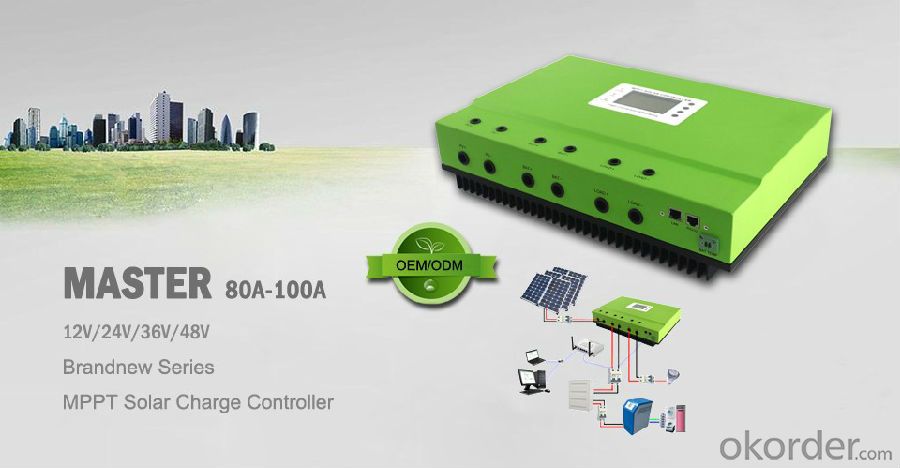
Products Advantages
1. MPPT charge mode,conversion efficiency up to 99%;
2. Maximum PV input is DC 150V;
3. Support all kind of batteries, non-normal type can be set on PC software;
4. Three stage charge mode: fast charge,constant charge,floating charge);
5. With temperature sensor;
6. Anderson connection port, avoide reverse connection;
7. RS232 and LAN communication port, free PC software;
8. Intelligent design,the device can be upgraded online;
9. The devices can suffer the temperature not less than 105°C;
10. Perfect protection:input lowvoltage,input overvoltage,input polarity reversal,
output over voltage,short-circuit over temperature;
11. Unlimited parallel;
12. 5 discharge mode;
13. LCD and LED show all kinds of parameter;
14. CE,ROHS,FCC certifications approved.The device also can support to pass the other certifications;
15. 2 years warranty and 3~10 years extended warranty service also can be provided.
Connection Diagram
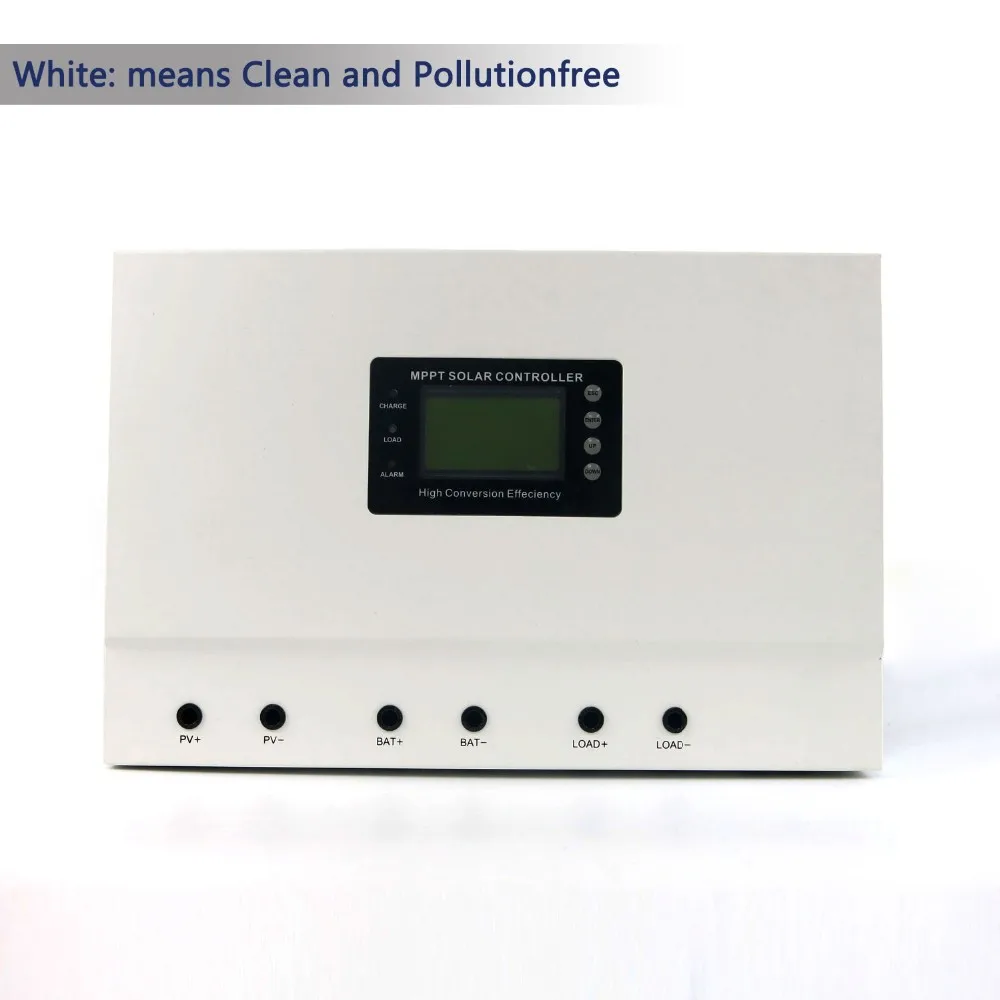
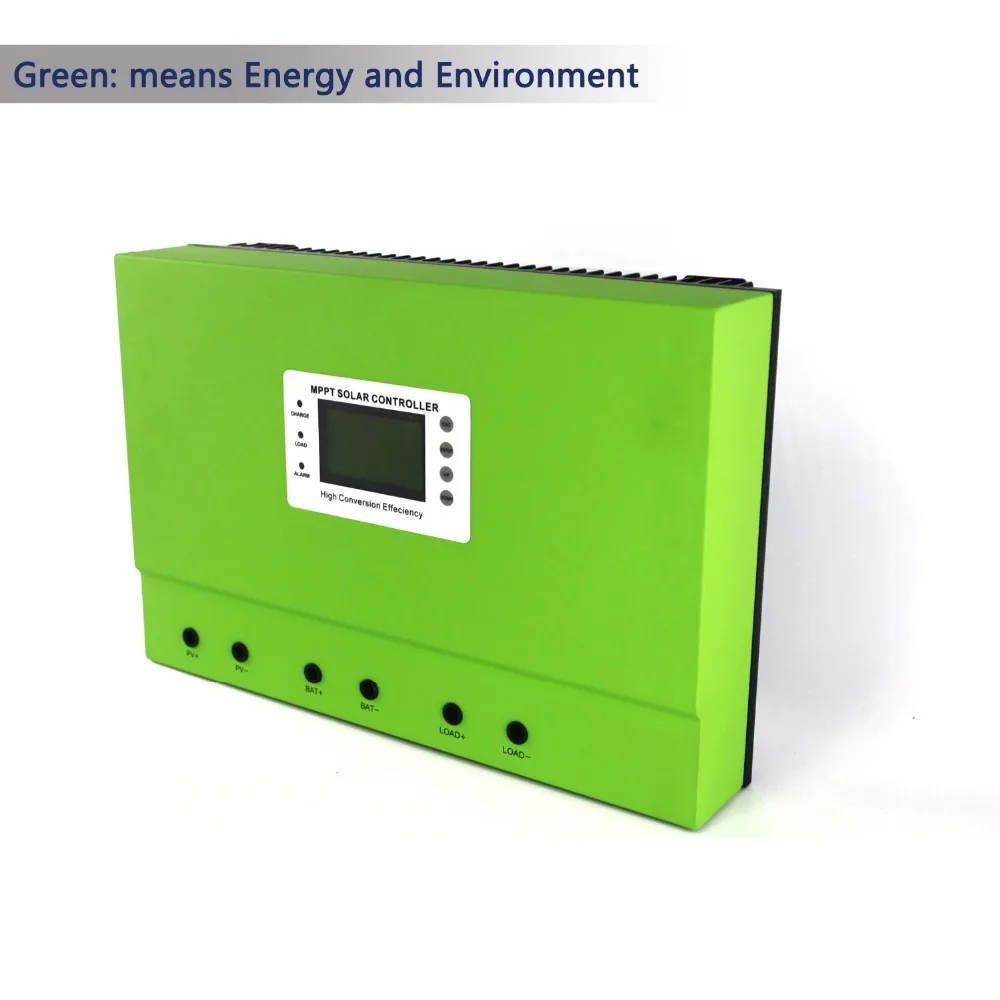
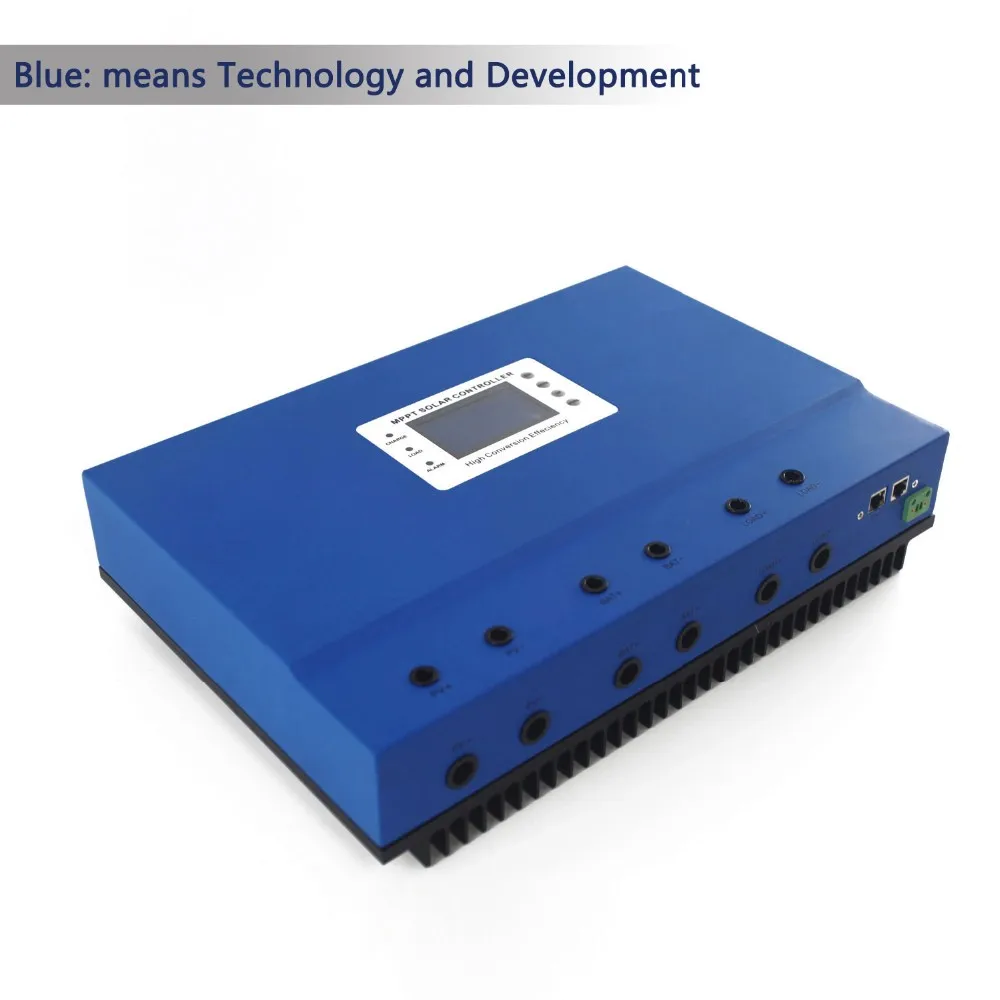
Upper PC Software
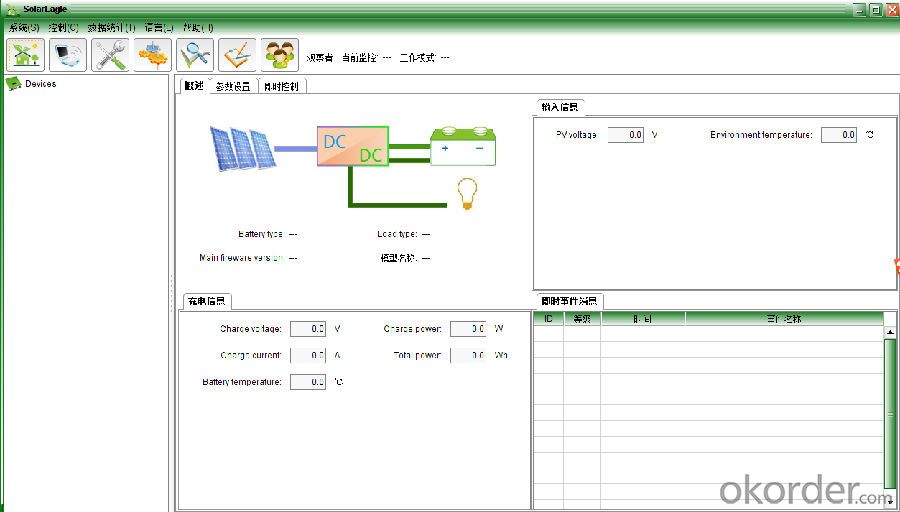
Test Software
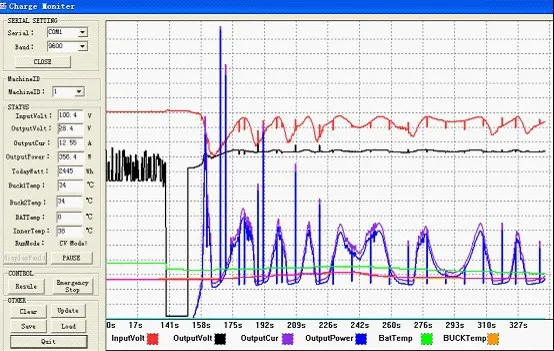
Parameter
MPPT controller Model: Master1-80A/100A Series | 80A | 100A | |
Charge Mode | MPPT(Maximum Power Point Tracking) | ||
Charge Method | 3 stages: fast charge(MPPT),constant voltage, floating charge | ||
System Type | DC12V/24V/36V/48V | Automatic recognition | |
Conversion Efficiency | DC12V/24V/36V/48V | 96.5% ~99% | |
PV Modules Utilization Rate | DC12V/24V/36V/48V | ≥99% | |
PV Input Characteristics | |||
MPPT Working Voltage and Range | 12V system | DC22V~DC150V | |
24V system | DC34V~DC150V | ||
36V system | DC50V~DC150V | ||
48V system | DC60V~DC150V | ||
Input Over voltage Protection Point | DC12V/24V/36V/48V | DC150V | |
Rate charge current | DC12V/24V/36V/48V | 80A | 100A |
Max. PV Power | 12V system | 960W | 1200W |
24V system | 1920W | 2400W | |
36V system | 2880W | 3600W | |
48V system | 3840W | 4800W | |
Charge characteristic | |||
Selectable Battery Types (Default type is GEL battery) | DC12V/24V/36V/48V | Sealed lead acid, vented Gel, NiCd battery (Other types of the batteries also can be defined) | |
Temperature Compensation | DC12V/24V/36V/48V | 14.2V-(The highest temperature-25℃)*0.3 | |
Discharge characteristic | |||
Setting Control | Controller or PC software | ||
Max discharge current | DC12V/24V/36V/48V | 100A | |
Output control mode | Double-time control, ON/OFF mode, PV voltage control, PV&Time control | ||
Physical | |||
Communication Port | RS232 and LAN | ||
Measurement D*W*H (mm) | 420*280*102 | ||
N.G(kg) | 7.5 | ||
G.N(kg) | 8.5 | ||
Color | Blue, Green, White (optional) or OEM | ||
Environment | |||
Humidity | 0~90%RH ( no condense) | ||
Altitude | 0~3000m | ||
Operating Temperature | -20℃ ~ +40℃ | ||
Storage Temperature | -40℃ ~ +75℃ | ||
Atmospheric Pressure | 70~106kPa | ||
Certifications |
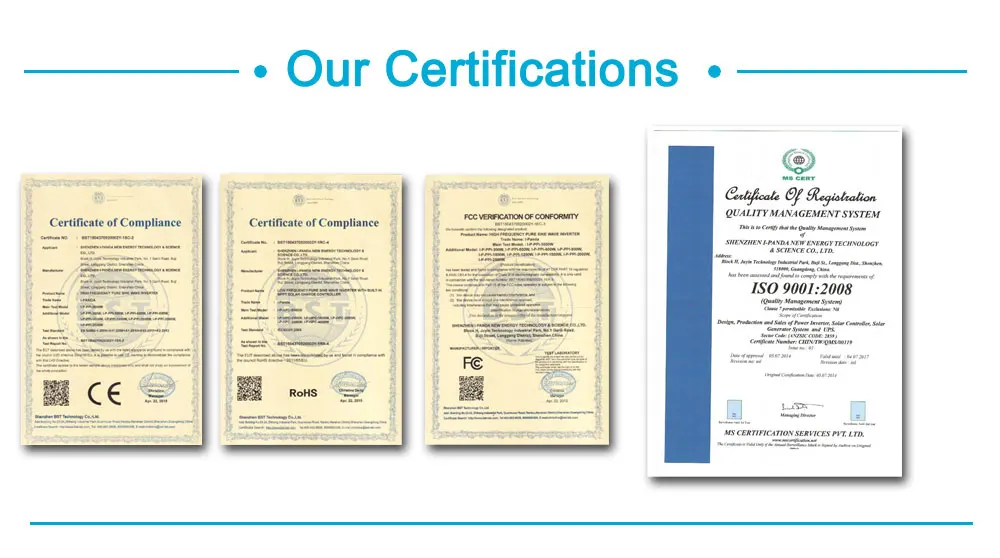
F&Q: |
Q1. How to ensure and monitor the products quality?
A1: We have established a perfect Quality Management System, In strict
accordance with ISO9001: 2008 quality system and ISO14001 environment system for quality assurance management;
Our ISO9001:2008 Quality System certificate encoding: CHIN/TW/QMS/00119;
Our ISO14001 Environment System certificate encoding: CHIN/TW/EMS/00028;
Q2. What is the warranty of products?
A2: The warranty period of different products are different; 5 years, 3 years, 2 years, 1 years; More details please refer to the product specification or manual; we will provide free life-long technical support ;
Q3. What is the difference between MPPT&PWM?
A3. MPPT charging mode, peak efficiency up to 99%, saving 30%~60% solar panel than traditional PWM controller.
- Q: Can a solar controller handle power spikes from lightning strikes?
- Yes, a solar controller is designed to handle power spikes from lightning strikes. It typically contains built-in surge protection mechanisms to safeguard the connected solar panels and other components from damage caused by lightning-induced power surges.
- Q: Do solar controllers require regular maintenance?
- Yes, solar controllers do require regular maintenance. This typically involves checking the connections, cleaning any debris or dust, inspecting the wiring, and ensuring proper functioning of the controller. Regular maintenance helps to optimize performance and prolong the lifespan of the solar controller.
- Q: Can a solar controller be used in a solar-powered research station in Antarctica?
- Yes, a solar controller can be used in a solar-powered research station in Antarctica. A solar controller regulates and optimizes the charging and discharging of batteries in a solar power system, ensuring efficient energy management. Given the abundant sunlight available in Antarctica during summer months, installing a solar controller would be crucial in maximizing the utilization of solar power and maintaining a stable energy supply for the research station.
- Q: Can a solar controller be used with different types of batteries (e.g., lead-acid, lithium-ion)?
- Indeed, various batteries, such as lead-acid and lithium-ion, can be utilized alongside a solar controller. The chief purpose of solar controllers is to oversee and govern the battery charging procedure, guaranteeing that they are charged at the correct voltage and avoiding both excessive charging and insufficient charging. They possess the capability to be programmed or fine-tuned to match the distinct charging demands of diverse battery types. This adaptability empowers users to link and charge an assortment of batteries using just one solar controller, presenting a versatile and practical resolution for solar power systems.
- Q: Can a solar controller be used with a solar-powered desalination system?
- Yes, a solar controller can be used with a solar-powered desalination system. A solar controller is responsible for regulating the voltage and current from the solar panels to ensure optimal charging of the batteries. As a solar-powered desalination system requires power from solar panels, the solar controller plays a crucial role in efficiently managing and controlling the flow of solar energy to power the system.
- Q: What is the role of temperature compensation in a solar controller?
- The role of temperature compensation in a solar controller is to adjust and regulate the charging and discharging of the batteries based on the temperature conditions. This is important because temperature affects the performance and lifespan of the batteries. By compensating for temperature variations, the solar controller ensures optimal charging and prevents overcharging or undercharging, which can damage the batteries.
- Q: What is the role of a solar controller in preventing battery overcharging?
- To prevent battery overcharging, the flow of electricity from the solar panels to the battery bank is regulated by a solar controller. When sunlight hits the solar panels, they produce electricity, which must be carefully managed to avoid overcharging the batteries. Acting as an intermediary, the solar controller, also referred to as a charge controller, monitors the voltage and current levels from the solar panels. It then adjusts these levels based on the battery's charge status. When the batteries reach full capacity, the solar controller restricts or completely stops the electricity flow from the panels to prevent overcharging. Overcharging the batteries can result in negative consequences such as decreased battery life, heightened maintenance needs, and potential safety hazards like explosions or fires. By preventing overcharging, the solar controller promotes the longevity and efficient operation of the batteries. Moreover, the solar controller may include additional features like temperature compensation. This feature adjusts the charging voltage based on the battery's temperature, further optimizing the batteries' performance and lifespan. In conclusion, the solar controller's main role in preventing battery overcharging is to regulate the flow of electricity from the solar panels to the batteries. This ensures the batteries are charged in the best and safest way possible.
- Q: What is the maximum current rating of a solar controller?
- The maximum current rating of a solar controller can vary depending on the model and manufacturer. However, common solar controllers typically have maximum current ratings ranging from 10 to 60 amps.
- Q: How does a solar controller handle electromagnetic interference?
- A solar controller handles electromagnetic interference by incorporating various protective measures such as shielding, filtering, and grounding. These components work together to minimize the impact of electromagnetic interference on the controller's operation and ensure the proper functioning of the solar system.
- Q: How do you connect a solar controller to a solar panel?
- To connect a solar controller to a solar panel, you would typically start by identifying the positive and negative terminals on both the solar panel and the solar controller. Then, you would attach the positive wire from the solar panel to the positive terminal on the solar controller, and do the same with the negative wire. This allows the solar controller to regulate the incoming power from the solar panel and efficiently charge a battery or power a load.
Send your message to us
Leading Solar Controllers Master100A MPPT Solar Regulator, 12V 24V 36V 48V Charge Controller 4000W
- Loading Port:
- China main port
- Payment Terms:
- TT OR LC
- Min Order Qty:
- 10 unit
- Supply Capability:
- 9999 unit/month
OKorder Service Pledge
OKorder Financial Service
Similar products
Hot products
Hot Searches
Related keywords
